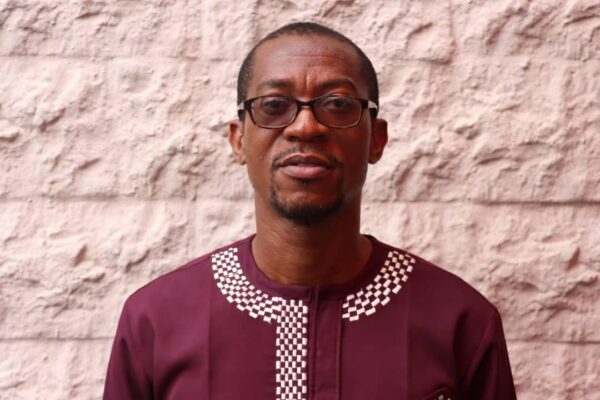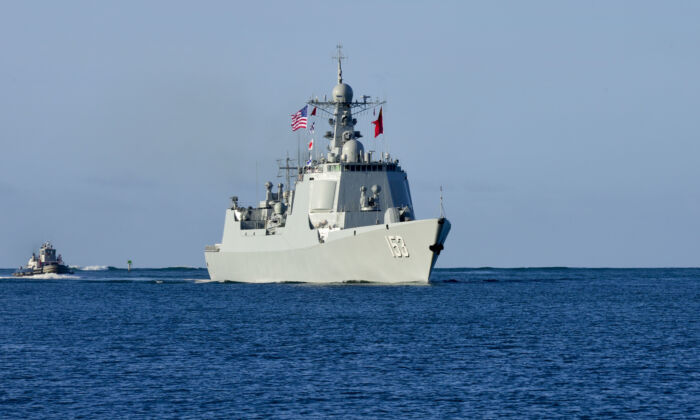•A Commercial Port in Equatorial Guinea Draws Speculation
By Nalova Akua
Washington security hawks have been aflutter for months over claims China plans to plant a naval base on the oil-rich tropical nation of Equatorial Guinea in West Africa.
The Wall Street Journal got the buzz going with a bombshell feature on Dec. 5, 2021, citing “classified American intelligence.”
“The officials declined to describe details of the secret intelligence findings. But they said the reports raise the prospect that Chinese warships would be able to rearm and refit opposite the East Coast of the United States—a threat that is setting off alarm bells at the White House and Pentagon,” according to the Wall Street Journal.
Top army officials have been vexed over the prospect since last May.
“They’re looking for a place where they can rearm and repair warships. That becomes militarily useful in conflict,” according to Gen. Stephen Townsend, who heads U.S. Africa Command.
“The Atlantic coast concerns me greatly,” he said in a May 2021 interview, pointing to the relatively shorter distance from Africa’s west coast to the United States.
Responses have been mixed: The claims are “alarmist and vague,” according to Foreign Policy
All the same, the thinking of policy experts interviewed by The Epoch Times suggests that Equatorial Guinea’s Atlantic-facing port city of Bata will host the Chinese naval base. The city—the country’s largest—already hosts China’s deep-water commercial port.

Thomas Cromwell warns that a Chinese base in West Africa would bring a China threat closer to American shores. (Courtesy of Thomas Cromwell)
“The Bata port is under-used right now, with the main export being timber,” Thomas Cromwell, president of East West Communications, told The Epoch Times in an email.
Cromwell, who made an advertorial for Equatorial Guinea and spent time there working with government officials, said despite its relatively small size the Bata port could accommodate naval vessels of middling size, but that “this would likely interfere with its commercial activities.”
“Equatorial Guinea has excellent infrastructure [ports, airports, roads] for a sub-Saharan country and it has the ambition to be a business hub for the Gulf of Guinea region,” he wrote.
“China would be thrilled to have a naval base at Bata. It would fit beautifully in its strategy of encircling America. A base in West Africa would bring that threat closer to American shores.”
China established its first overseas military base in the Horn of Africa in Djibouti in 2017 to the tune of $590 million.
Situated at the strategic entrance to the Red Sea corridor across from Yemen, Djibouti today hosts military installations belonging to the United States, Germany, Spain, Italy, France, the UK, Japan, and Saudi Arabia.
But Washington is particularly concerned about a Chinese military presence on the Atlantic coast.

Dr. Freedom Onuoha says Equatorial Guinea’s unique location—almost in the middle of Africa’s Gulf of Guinea—suggests a perfect location for a Chinese naval base. (Courtesy of Freedom Onuoha)
“A Chinese base in the Atlantic Ocean can play a decisive role in cutting off U.S. access to strategic resources from many African states if conflict breaks out in the future,” according to Dr. Freedom Onuoha, a senior lecturer at the Department of Political Science at the University of Nigeria–Nsukka.
“In a situation of intense hostility or great power confrontation in the future, it makes it a lot easier for China’s naval forces to stroll up and down Africa’s Atlantic coastline,” Onuoha told The Epoch Times.
The United States has heavily invested in the oil sector in Equatorial Guinea, which has provided the regime great financial wealth and has turned the country into a middle-income nation.
But Washington has recently come out against the country’s poor human rights record and corrupt governance.
Experts speculate U.S. pressure might be pushing the West African country to move toward China, which has equally invested in the country extensively in recent years.
“The emerging developments in a tiny, fragile country such as Equatorial Guinea in terms of two major global powers’ competition for resources and warm relations is a promising and perilous trend,” Onuoha said.
“It is promising in that with the right leadership, Equatorial Guinea can get the best value for her resources that are sought after by these powers. It is perilous because either of the powers can invest in, or engineer forces to destabilize, the tiny African country should it lose out in the evolving diplomatic and business environment.
“This also has wider implications for good governance, as the government in power may lean on China for survival while undermining human rights of citizens. China’s investment in oil and maritime sectors of Equatorial Guinea makes the situation even more dangerous,” he said.
For now, China’s real intentions for building a naval base in Equatorial Guinea remain murky. While some observers believe China’s desire for ocean access may be chiefly for economic gains, others believe a Chinese base is one of many on Africa’s Atlantic coast that will shift global power dynamics.
Cromwell holds the latter view.
“Europe has powerful historical ties with Africa, but has not been very aggressive in fostering development in Africa until a recent decision by the European Union to compete with China’s Belt and Road initiative in Africa,” he told The Epoch Times.
“There are a few critical sectors that Europe and the United States should focus on, including energy, infrastructure, agriculture, and trade.
“Instead of avoiding engagement because of concerns over poor governance and human rights, they should pursue an aggressive program of investment and trade to help Africa modernize, in both governance and infrastructure.”
The Chinese show no concern for governance or human rights in Africa.
“This attitude makes it easy for them to do business with less-than-savory regimes in Africa, but it also translates into very negative behavior toward the people of Africa, including disastrous economic entanglements for African governments and the replacement of Africans with Chinese in the workforce, stunting indigenous economic growth,” Cromwell said.
But Onuoha is rather more concerned with the economic spinoffs that could come with China’s ocean access.
“Entrance or foothold in Equatorial Guinea, as elsewhere in any other African country, is a product of Chinese expansion,” he said.
“As she wins trade concessions and finances infrastructural development, China looks likely to displace both the US and Europe in Africa.
“If not successfully resisted, the costs will come in different shades: decline in their share of trade with African countries, limited leverage to influence the internal politics of African states, and loss of African votes on issues before the United Nations Security Council.”
Nalova Akua is a Cameroonian multimedia freelance journalist
Credit | The Epoch Times

